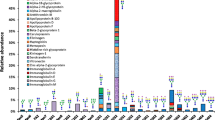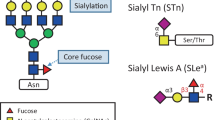Summary
Increasing knowledge on structure, biosynthesis and catabolism of glycoproteins have given new insights on the patho-biochemical and clinical significance of these macromolecules. The most important results and conclusions are summarized in this review.
1. The terminal sugars of glycoproteins—N-acetylneuraminic acid (NANA) and L-fucose—as well as the penultimate galactose molecule have important functions in cell interaction, adhesion and recognition. Moreover, these carbohydrates mediate the migration and distribution of cells and it is believed that they are essential part of the feto-maternal “immunological barrier”.
2. Evidence indicating that the composition and pattern of plasma membrane glycoproteins is associated with tumour growth and metastatic formation is accumulating. Moreover, the determination of serum glycosyltransferase activity is gaining increasing interest, because the level of theses enzymes is substantially elevated in patients with neoplastic disease.
3. Diseases of the autoimmunosystem are likely linked to a disturbed glycoprotein metabolism. The clinical importance is underlined by studies on immunotherapy of tumours.
Zusammenfassung
Zunehmende chemische und biochemische Kenntnisse über Struktur, Biosynthese und Katabolismus der Glycopteine haben auch neue Einblicke in die Pathobiochemie und klinische Bedeutung der Glycoproteine ermöglicht. Diese werden in der vorliegenden Übersicht zusammenfassend dargestellt.
1. Während der Fetalperiode besitzen die endständigen Kohlenhydratreste der Glycoproteine wichtige Funktionen bei der Zell-Adhäsion, -Fusion und gerichteten Migration. Daneben wird die Rolle der endständigen N-Acetylneuraminsäure (NANA) von Glycoproteinen für die immunologische Toleranz zwischen Mutter und Kind diskutiert.
2. Unter onkologischen Gesichtspunkten wird der Einfluß des Glycoproteinmusters der Plasmamembran für das Tumorwachstum und die Metastasierung beschrieben. Veränderte Glycosyltransferase-Aktivitäten im Serum von Tumorpatienten gewinnen zunehmend an diagnostischer Bedeutung.
3. Durch endständige Kohlenhydratreste von Glycoproteinen wird nicht nur die Immunogenität von Makromolekülen, sondern auch die Immunkompetenz des Organismus beeinflußt. Hierdurch erlangen diese Strukturen sowohl bei der immunologischen Tumorabwehr als auch bei Autoimmunerkrankungen klinische Relevanz.
Über Ergebnisse ausgewählter Fachgebiete wird in einer nachfolgenden Übersicht berichtet (Klin. Wochenschr.57, 199 (1979)
Similar content being viewed by others
Literatur
Die Literaturhinweise finden sich zusammengefaßt am Ende des 2. Teils der Übersicht (Klin. Wochenschr.57, 199 (1979)
Author information
Authors and Affiliations
Additional information
Professor Dr. Hans Popper zum 75. Geburtstag gewidmet
Mit Unterstützung der Deutschen Forschungsgemeinschaft
Rights and permissions
About this article
Cite this article
Köttgen, E., Bauer, C., Reutter, W. et al. Neue Ergebnisse zur biologischen und medizinischen Bedeutung von Glycoproteinen. Klin Wochenschr 57, 151–159 (1979). https://doi.org/10.1007/BF01477402
Received:
Accepted:
Issue Date:
DOI: https://doi.org/10.1007/BF01477402




